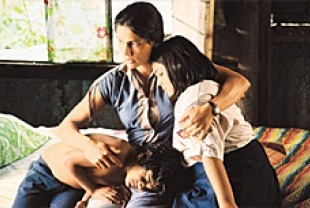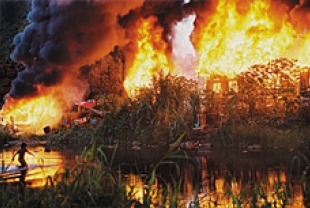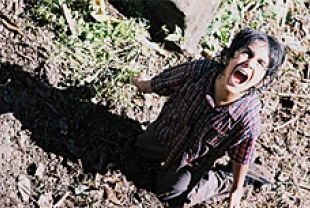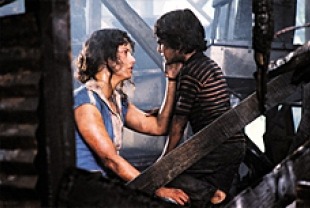In 1980, civil war in El Salvador is raging between the Salvadoran army and the guerillas, who are mainly peasants. Suffering the most terrible losses are the people caught in the crossfire — the poor, who live in cardboard houses and are subjected to curfews and night-time gunfire. Eleven-year old Chava (Carlos Padilla) lives with his mother Kella (Leonor Varela), a seamstress, and his sister and younger brother. When the war started, his father fled to the United States, and ever since then Chava has been forced to become the man of the house. Of course, he's still a kid who loves to climb trees and run freely through the streets of the village where he lives. But childhood in El Salvador during these harsh times can end with a bullet or the dreaded recruitment of all twelve-year olds into the Salvadoran army.
While his mother is at work, Chava manages to save his brother and sister when gunfire rips through the walls of their flimsy house. When she returns home that day, Kella decides to work out of her house from then on with her own sewing machine. At school, Chava becomes the boyfriend of Cristina and lands a part-time job working on a bus. He is very proud to give the money to his mother. But there is no guarantee that any of this will last given the frequency of the skirmishes in town.
During a visit by Uncle Beto (Jose Maria Yazpik), the neighborhood comes under fire and a girlfriend of Chava's sister dies while he tries to stop the blood from her chest wound. Kella's brother has joined the guerillas and he gives his nephew a radio which broadcasts "the voice of the people" and an anthem of love and peace. But when Chava almost gets picked up by the army for listening to the banned radio station, his mother takes the radio away. The little boy — who pays close attention to what is going on around him — is stunned by the courage of the local priest (Daniel Gimenez Cacho) when he tries to defend two young girls who are grabbed by two soldiers. Later, the priest tells the villagers that although they rest in the grace of God, they must speak out against the senseless violence of the Salvadoran army. For this prophetic stand, he is taken away by the soldiers.
Luis Mandoki (Gaby) directed Innocent Voices and collaborated on the screenplay with Oscar Torres, who pulled from the horrific events of his own life during the civil war in El Salvador. This powerful drama puts a face on the mind-boggling statistic that more than 300,000 children presently serve in armies in over 40 countries.
We see a poor family under siege, where terror has become an unwanted member of the household. We see twelve-year old boys yanked out of classrooms, lined up in front of their peers and taken away by government soldiers. We watch as some children fly paper airplanes in the sky and have to hurry home before curfew falls and their parents worry about their whereabouts.
We witness a little boy whose father is gone grab desperately to the leg of every male that enters the household and call him "Daddy."We watch in panic as boys put flyers in every home telling about the recruitment which will take place the next day. Many of them escape the soldiers by hiding on the roofs of the shacks. To be a boy in El Salador during this Dirty War means that turning twelve brings with it being drafted and almost certain death.
Perhaps one of the saddest scenes in Innocent Voices is when Chava takes a piece of gum from an American soldier — a woman tells Chava to spit it out because it came from a man who trains the soldiers that kill the villagers. At one time the United States spent over a million dollars a day supporting the brutal tactics of the Salvadoran government's soldiers and their death squads.



